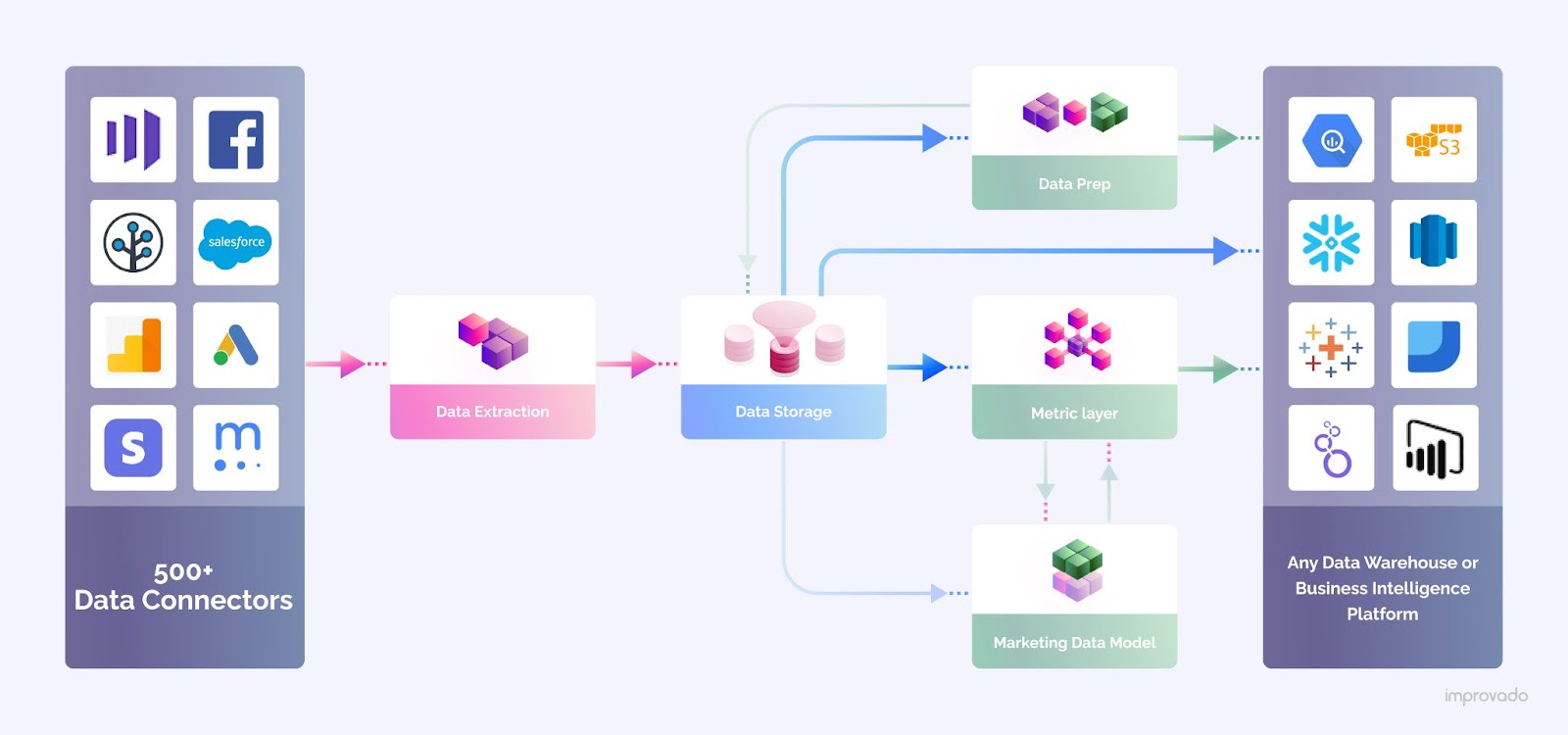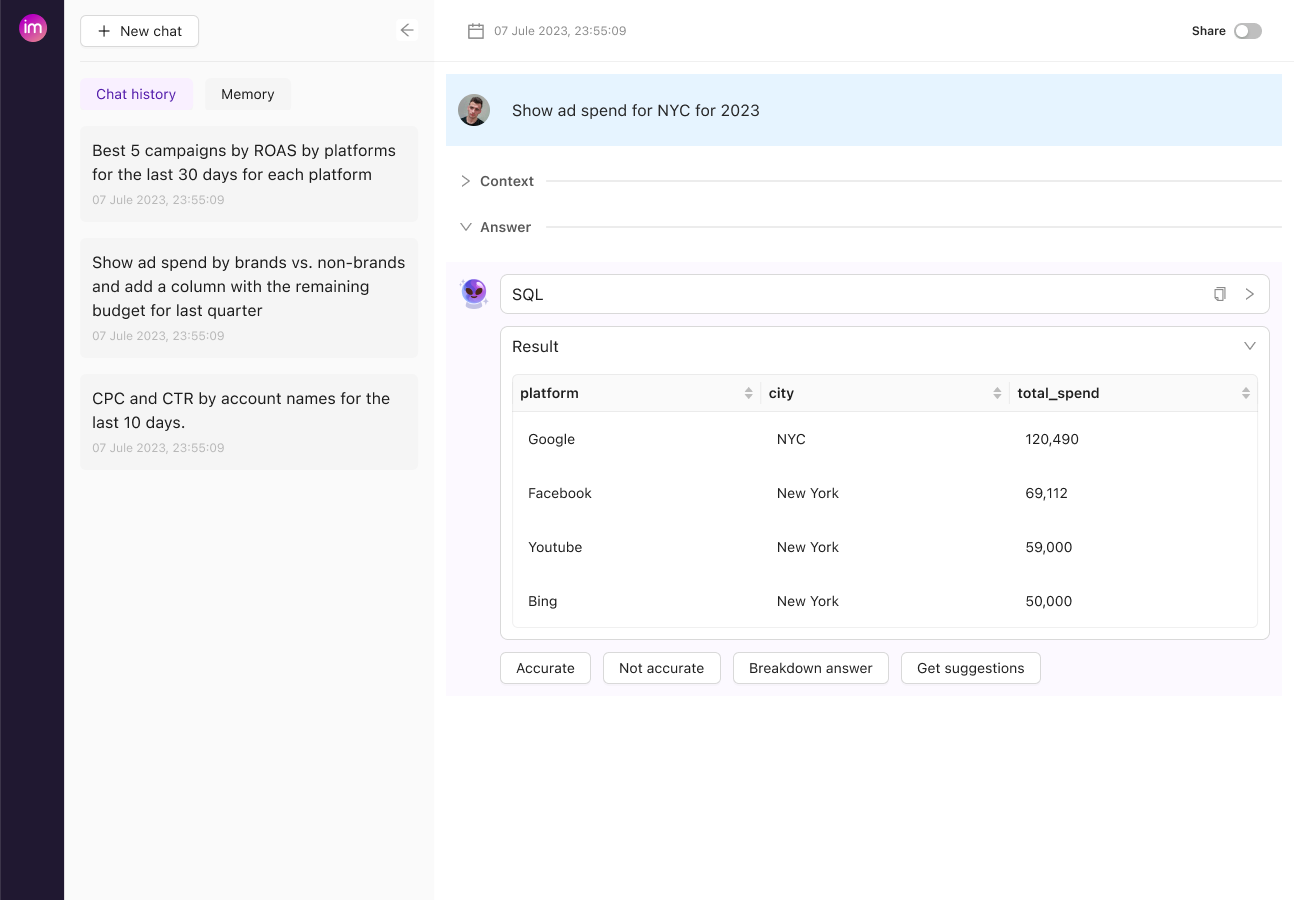While the idea of leveraging data to make more informed marketing decisions is not new, the growing volume of data and the increasing risks of making a bad decision or simply taking too long to make a decision have made the integration of advanced tools to streamline the process more popular.
Decision intelligence is an emerging field that aims to address these issues and enhance decision-making by leveraging advanced technologies like artificial intelligence, natural language processing, and others.
In this article, we'll explore the core aspects of decision intelligence, its key capabilities, and the profound impact it has on business operations and strategy.
What Is Decision Intelligence?
Importance of Decision Intelligence
Gartner forecasts that by 2024, one-third of large organizations will implement decision intelligence to enhance their structured decision-making processes, thereby boosting their competitive edge and enhancing operational efficiency.
Here are the key reasons why decision intelligence is important and is gaining momentum among enterprises:
- Operational efficiency: Decision intelligence automates routine operations, allowing marketers to focus on more strategic tasks that require human insight. This automation not only speeds up operations but also reduces the likelihood of errors associated with manual processes.
- Cost reduction: Decision intelligence can significantly reduce costs by optimizing resource allocation and improving operational efficiency. By improving the accuracy of targeting, optimizing resource allocation, and enhancing campaign responsiveness, decision intelligence directly contributes to an increased return on investment.
- Data democratization: Decision intelligence makes data and insights accessible to stakeholders across different levels of an organization. This accessibility empowers more employees to make data-driven decisions and contribute to the organization's strategic goals.
- Sustainable marketing practices: By providing clear insights into what strategies work and what don’t, decision intelligence helps firms avoid wasteful marketing spending and adopt more sustainable practices. This not only conserves resources but also aligns marketing efforts more closely with the company's broader environmental and social goals.
These benefits highlight the extensive capabilities of decision intelligence in transforming marketing strategies by providing deeper insights, enabling proactive decision-making, and enhancing the efficiency and effectiveness of marketing operations.
Key Components of Decision Intelligence
Decision intelligence is a sophisticated framework that combines several components. Understanding these components is crucial as they work together to enhance marketing effectiveness through data-driven strategies.
Data Integration
Data integration involves consolidating data from various sources, such as CRM systems, social media, sales platforms, and customer feedback tools, into a unified data environment. This component is critical as it ensures that all decisions are based on a comprehensive view of the customer and market dynamics, rather than isolated data sets.

Improvado provides a solid data foundation for a cohesive analytics framework and decision intelligence. The platform aggregates data from 500+ marketing and sales platforms, CRMs, and offline sources, automatically prepares it for analysis, and securely loads it to a data warehouse or a BI tool of your choice. Improvado helps brands have access to real-time, actionable insights derived from their data.
Analytics and Modeling
This component uses statistical methods and machine learning algorithms to analyze the integrated data. Analytics and modeling help identify patterns, predict outcomes, and generate insights that are crucial for making informed marketing decisions. For instance, predictive modeling can forecast customer behaviors and preferences, enabling targeted marketing strategies and personalized customer experiences.
Data Visualization
Data visualization translates complex data analysis into graphical representations, such as charts, graphs, and heat maps. These visual formats make it easier for marketing teams to interpret data, discern trends, and communicate findings clearly across the organization. Effective data visualization aids in quicker understanding and facilitates the presentation of insights in a way that is accessible to all stakeholders.

Self-service data visualization tools, in particular, empower non-technical users to access and analyze data without needing extensive technical expertise. Tools like AI Agent allow marketers to create their own reports and visualizations with natural language processing, fostering greater independence and faster decision-making.
Decision Management
Decision management is the process of applying rules and logic to automate decision-making processes based on the insights generated from analytics. It ensures that decisions are consistent and aligned with business objectives. For marketing managers, decision management tools can help automate routine decisions, such as email campaign triggers or ad placements, allowing them to focus on more strategic tasks.
Decision Execution
This decision intelligence component focuses on implementing the chosen strategies and decisions effectively. It includes tools and platforms that integrate decision outputs directly into marketing operations, ensuring that insights lead to actionable changes.
Decision execution helps in operationalizing analytics insights into real marketing campaigns, optimizing both the timing and content of marketing messages according to the intelligence provided.
The Role of AI in Decision Intelligence
Artificial intelligence is integral to decision intelligence, fundamentally transforming how data is processed and analyzed to support decision-making. AI enhances decision intelligence through several key mechanisms:
- Decision optimization: AI plays a crucial role in decision optimization by systematically refining decision-making processes based on ongoing data analysis and learning. As more data becomes available, AI can make better decisions. Besides, AI not only predicts outcomes but also suggests the most effective courses of action based on the predictions.
- Natural language processing (NLP): AI employs NLP to interpret and process human language. This ability allows marketers to interact with decision intelligence tools like AI Agent using plain English. AI Agent acts like a personal marketing analyst that understands questions and tasks in plain language and can handle the majority of requests you would traditionally refer to the data team.
- Anomaly detection: AI algorithms are adept at identifying patterns and, importantly, deviations from these patterns. This is crucial for monitoring UTM consistency, overseeing campaign performance metrics and adherence to different guidelines and compliancies.
- Complex decision modeling: AI can model complex decision-making scenarios involving multiple variables and potential outcomes. These models can simulate different scenarios, helping decision-makers understand potential impacts before making a commitment. This is particularly useful in strategic planning and policy development.
Improvado AI Agent: A Closer Look at a Decision Intelligence Platform

Improvado AI Agent is an example of a decision intelligence platform that streamlines complex decision-making processes by facilitating dynamic interaction with marketing data through natural language queries and AI.
AI Agent connects directly to your marketing dataset, offering a chat interface that allows users to ask ad-hoc questions, build dashboards, evaluate campaign performance, manage budget pacing, and much more. This interaction significantly reduces the dependency on data specialists, with AI Agent autonomously resolving up to 82% of queries that would typically require expert intervention.
How Does It Work?
At the core of AI Agent’s effectiveness is a robust data foundation, facilitated by the Improvado data pipeline.
Improvado’s data pipeline seamlessly integrates data from over 500 diverse sources, encompassing a wide range of online and offline channels. This comprehensive data collection is crucial for creating a holistic view of marketing efforts and consumer interactions.
Once data is collected, the Improvado data pipeline employs sophisticated mapping and preparation techniques to transform this vast array of data into a standardized format suitable for analysis.
The solid data foundation allows AI Agent to function effectively as a decision intelligence platform. With confidence in the data’s accuracy and completeness, marketing specialists and managers can rely on the insights and recommendations generated by AI Agent.
From AI to Decision Intelligence
Integrating AI into marketing operations has proven to be a transformative step for many organizations, enhancing data analysis and automating routine tasks. However, as the complexity and speed of the marketing environment continue to increase, merely applying AI is no longer sufficient. The next step involves advancing from isolated AI applications to a holistic framework — decision intelligence.
Decision intelligence bridges the gap between data science and practical business applications, turning raw data into actionable strategies. By contextualizing AI-generated insights within the broader business objectives, decision intelligence provides a pathway for these insights to directly impact marketing decisions and actions.
Testing a decision intelligence platform like Improvado AI Agent can serve as a practical first step. This tool exemplifies how AI can enhance data analysis, providing intuitive interfaces and sophisticated analytics that support marketing objectives directly.
.png)
.jpeg)


.png)
